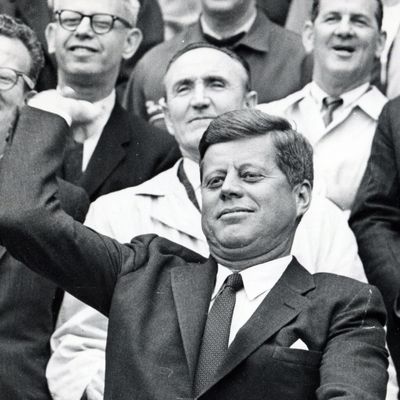
To those of us who remember him not as an icon but as a living human being, the reminder that today is the 100th anniversary of the birth of the 35th president of the United States, John F. Kennedy, is especially shocking, if only because at the time of his death he was a great symbol of youth and (to use one of his favorite words) vigor. The farther we get from his soul-searing death, the greater the perspective we have on his shortcomings as well as his strengths (from what we now know of his sexual ethics, for example, it seems astonishing that Fr. Andrew Greeley once proposed he be designated a “Doctor of the Church,” like St. Thomas Aquinas).
We’ll never know had he avoided assassination if he would have renounced the war in southeast Asia he largely began, or would have consummated the civil rights revolution, or might have avoided the fracturing of American politics and culture in the late 1960s. Part of the family legacy he exemplified was ideological ambiguity: it’s no accident that both sides in many a “struggle for the soul of the Democratic Party” claimed JFK and RFK as their inspirations.
But 57 years after his election as president, one thing is clear: the two groups of Americans who most revered his memory–who were most likely to have placed photographs or paintings of the 35th president on the walls of their homes– have since gone their separate ways. That would be African-Americans, for whom he was the first Democratic presidential candidate to advocate a real attack on Jim Crow, and Catholics (who at the time were overwhelmingly white, and mostly Irish, Italian, German and Polish), for whom he represented the final emancipation from a milder but very real second-class citizenship.
It has often been observed that it was Lyndon Johnson who accomplished everything and more that Kennedy advocated with respect to civil rights. But LBJ explicitly made passage of the Civil Rights Act of 1964 a memorial to JFK’s life and values. And there’s not much question that Kennedy provided a decisive blow to the alliance between northern liberalism and southern segregationism that had prevailed since the days of William Jennings Bryan and Woodrow Wilson through the New Deal and beyond (it was for a moment threatened by Harry Truman, but held strong when Dwight D. Eisenhower and the Supreme Court led by his nominee as Chief Justice, Earl Warren, briefly renewed the GOP’s legacy as the party of civil rights).
The Civil Rights Act eventually unharnessed the Solid South from the Democratic Party, but the Kennedy campaign of 1960 (and a counterveiling anti-Catholicism) got the ball rolling, making the region highly competitive, which is why JFK came barnstorming through the Georgia town where I and my elementary school classmates were allowed to walk a few blocks in the middle of the day to catch a glimpse of the candidate as he waved from an open car. He ultimately held Georgia, and the Carolinas, and Louisiana and Arkansas and (thanks to LBJ) Texas. But his victories elsewhere were very often attributable to a coalition that featured landslide performances among African-Americans (roughly two-thirds of their votes) and white Catholics (somewhere between 70 and 80 percent of their votes).
In 1964 LBJ would do as well among Catholics, and immensely better among black voters, choosing between a champion and an opponent of the just-signed Civil Rights Act. But after that the two groups began to diverge. Next time a Catholic was the Democratic nominee for president, in 2004, he lost white Catholics to George W. Bush. And in 2016, the Republican percentage of the white Catholic vote hit an all-time peak at 60 percent, even as the GOP candidate won only 8 percent of the African-American vote.
With all the talk about Trump’s landslide among white evangelical voters—and it was impressive—this quieter tide from white Catholics was equally important. And for those who remember the Kennedy coalition, it was significantly more jarring.
What would “Doctor of the Church” JFK have made of all those Irish and Italian and German and Polish Catholics, many with deep collective memories of discrimination against immigrants and religious minorities, voting for a man like Donald Trump? We’ll never know; the politics of 2016 might have even astonished Ted Kennedy, who survived JFK by 45 years. But even as Republicans perpetually imagine a “breakthrough” among Latino and African-American voters that will improve their demographic destiny, Democrats will always dream of a candidate or a cause that will again unite those who voted for JFK in solidarity against a WASP hegemony that still exercises enormous power in this country. That dream is now getting as hazy as the old folks’ personal memories of John Fitzgerald Kennedy.






























